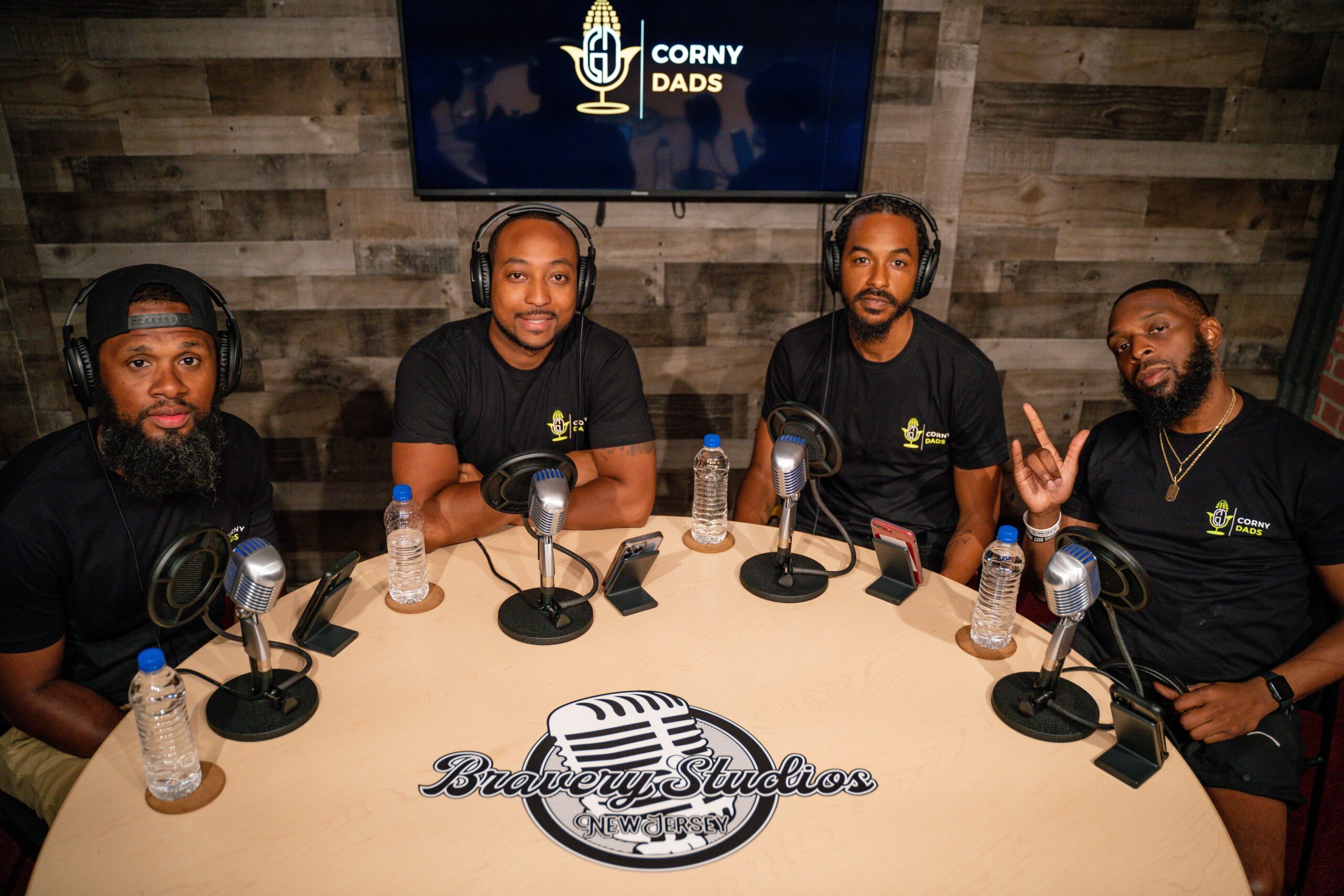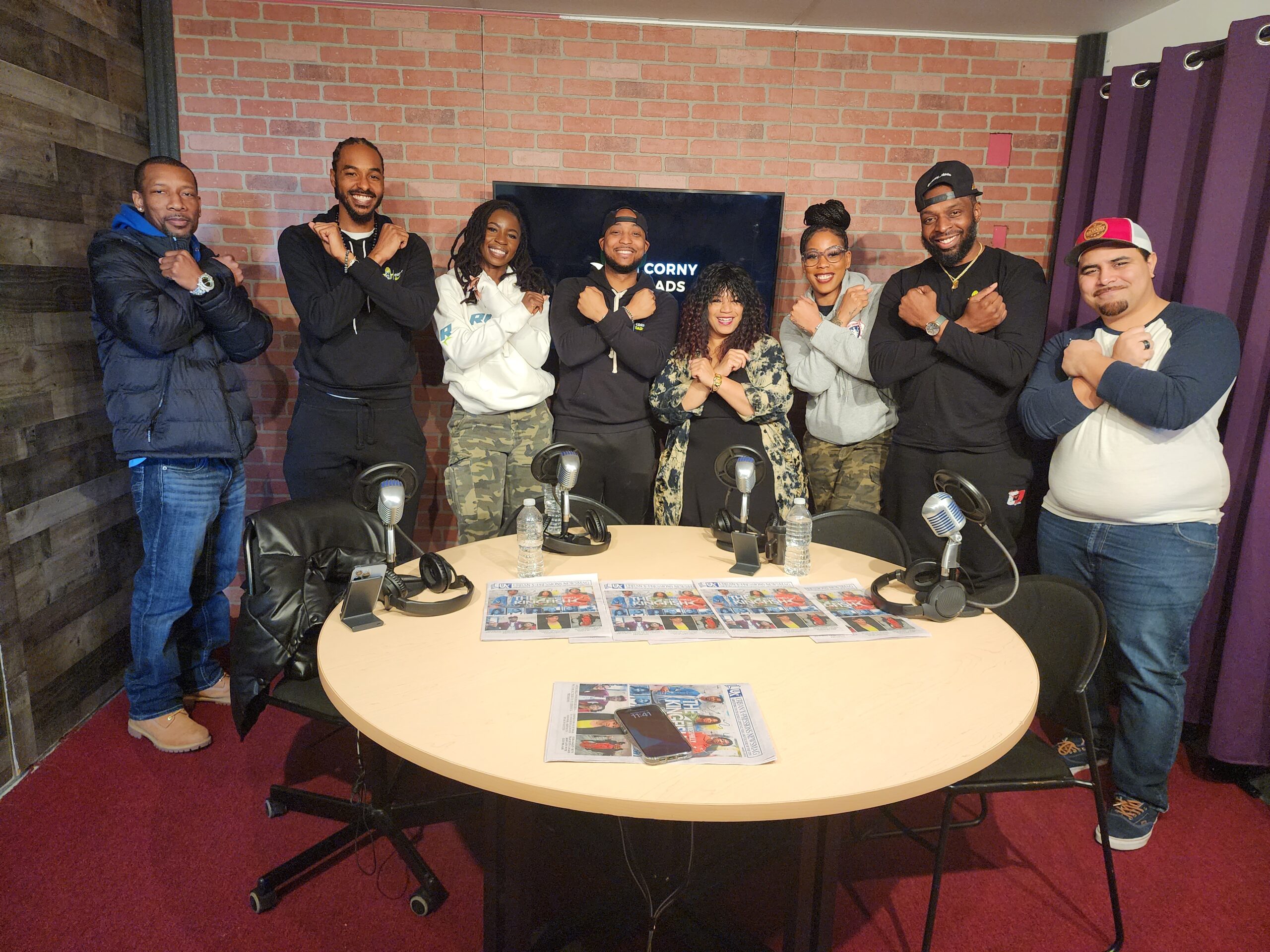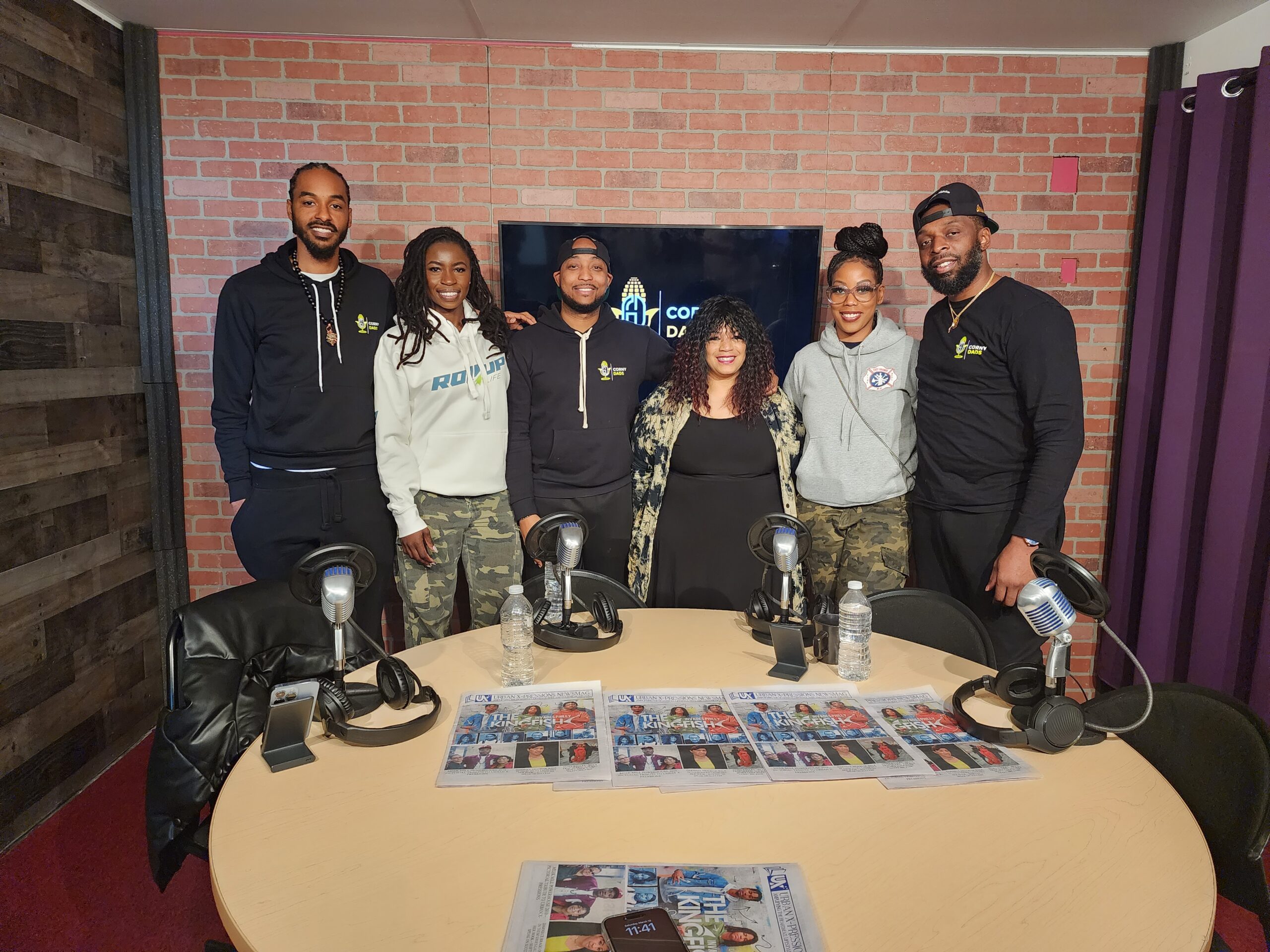Corny Dads is a podcast hosted by Yogi Den (Dennis D. Davis), Oz (Osner J. Charles), Snug (C.J. Harris), and Chico (Alan P. Mentor), breaking all the dad stereotypes, bringing their unique parenting styles into the limelight. They’re not just dads; they’re a pack of superheroes raising their kids with love, laughter, and a generous dash of dad humor.
Get ready to dive into the thrilling, fulfilling, and sometimes the hilariously corny world of modern fatherhood with your hosts, the fabulous four of the dad universe. Corny Dads airs on Urbanxpressionsradio.com every Sunday at 12n and is available on all podcast streaming platforms.
Welcome aboard, folks, to the corniest, coolest, and most candid dadventures ever!
Shelly Shell: What inspired you to start the Corny Dads podcast, what is your mission with the show, and in what ways do you think modern fatherhood has evolved over the years, and how do you showcase that on your podcast?
Oz: The inspiration for Corny Dads came from my son saying, “Dad, you’re so Corny,” which is the drop at the beginning of every episode. Inspiration was also pulled from conversations I would typically have with other dads/men in the community. All of the conversations felt impactful and/or helpful. During these conversations, I noticed the men put their pride and egos to the side and truly spoke from a pure and authentic space. We worked together to process situations and helped each other navigate fatherhood, manhood, and overall life. I personally needed this outlet because, during this time, I was personally going through so much in my life. I had so many questions, and I was in search of answers. I wanted to be a student and learn through the experience of others. I wanted to get an idea of their backstories and the glorious moments in their lives. I also wanted to know how they were able to overcome the pain which led them to become who they are today… A Corny Dad.
Honestly, I don’t think modern-day Fatherhood has really evolved much over the years. I truly believe the essence of being a father is still the same. For example, Clifford Huxtable (The Cosby Show 1984-1992) and Andre “Dre” Johnson (Black-ish 2014-2022) are the same characters. As Dads, they both professed, protected, and provided for their children and the overall nuclear family. They practice emotional intelligence, set boundaries, and also discipline their children when necessary. These are all the same things Corny Dads are doing globally.
However, we are in the digital age, where children are constantly bombarded with images, instructions, and influences from the world around them. There was a time when the father’s primary role was to be the breadwinner of the family. He would spend most of his time out of the house and away from the daily activities of the children. We are now seeing fathers take on an additional role as nurturers. With the adoption of the digital age, the flexibility of finding a balance between work and family has become a reality. You can see more fathers walking their children to school, coming to parent-teacher conferences, and being more involved in conversing with their children about their emotional, physical, and spiritual needs.
Shelly Shell: Can you share some examples of the “Corny stuff” you do for your kids and why you think it’s important to do these things as a father?
Yogi: We think it’s only right to define what “Corny” truly means as it relates to the Corny Dads. “Corny” pertains to an individual doing the things necessary for his child to thrive. It’s going over, above, and beyond the call of duty to protect, provide and nurture the needs of the child.
Example: Oz is a self-proclaimed helicopter dad. We don’t see that as a negative. A helicopter dad is a father that makes sure that his eyes are always on his son’s progress educationally, emotionally, physically, and spiritually. He shows up to every parent-teacher conference, track meet, basketball game, and after-school activity his son is involved in, clocking his times, studying his movements, and participating in science projects. Even at practices, you can catch corny dad Oz on the sidelines screaming as if his son just won the presidential election. Spiritually, Oz also practices daily prayer and meditation with his son.
Corny Dad Snug is known as the emotional supportive father. Although he is assertive and encourages his sons to be disciplined, he displays compassion and emotional support by way of frequent meditations, journaling, and or just providing space for them to share what’s on their hearts and minds. Snug takes time to observe and understand what each one of his children’s gifts and troubles may be. He finds creative ways for them to work through their issues that align directly with their gifts.
Shelly Shell: Dennis, you are a certified yoga instructor. How has your yoga practice impacted your role as a father, and how do you encourage other dads to explore mindfulness and self-care?
Dennis: There was a time in my life when I struggled with my identity. This consequently happened after my father passed away in 2005 from cancer. My identity was tied to his accomplishments, community role, and impact. When he died, I could no longer hide behind his work. I was forced to look at myself in the mirror to accept myself as weak, confused, and scared.
At the same time that I confronted myself as basically nothing, I found out my girlfriend was pregnant. Now confused, scared, and weak, I had to raise a child! Sometimes God forces us into the position where he needs us to be. Before I found the Asana Practice (Postures) of yoga. I unconsciously put some principles to use. I knew I had to let go of certain thoughts, behaviors, and cycles. I knew I had to find purpose (Dharma), a new strength inside of me, if I was going to be able to raise this child. I had to let a force bigger than myself guide me.
It wasn’t until later, I officially found the science of YOGA, or should I say, it found me again at one of the darkest and scariest times in my life. The day I will never forget. I took a heated YOGA class. I remember the anxiety, the fear, and the insecurities ramping up. The emotions that men are told we aren’t supposed to have or supposed to feel. I felt all of them, and I stayed. By the end of the class, I was crying, sobbing, and releasing so much of what I had stored inside. The pain, guilt, resentment, and worthlessness were being released through each tear that dropped to that mat. I rose from that mat a different man than who I was when I sat down. Since then, I stopped drinking alcohol; I’m much more patient and aware, and in tune with the people around me. I am more courageous and fearless. I am walking in my purpose of helping anyone I can to be able to reach their higher selves and purpose. We need more men, more fathers with this clarity, strength, and purpose.
Shelly Shell: Oz, you are a mentor to many young people. How do you balance being a mentor with being a father, and how do you think mentoring can benefit other dads and families?
OZ: Balancing responsibilities can be challenging, but it’s important to prioritize and manage time effectively. As a father and a mentor, it’s important to set aside dedicated time for both roles and to communicate openly with those around you to ensure that everyone’s needs are being met… Everything you just read is easier said than done. It’s very difficult balancing the two. Not to mention, you have to manage your career and relationships with family, friends and other loved ones. This isn’t a simple task at all. I commend all of the men who successfully balance all of these titles. For those that do, I do have a question; when do you find time for you? That’s something that I’m still struggling with. Through it all, I am clear my role as a father comes before everything and anything. I know the impact of not having my father fully present in my life had on me. Nurturing the relationship with my son is important because I am clear about the generational impact that it will have.
I would encourage any man that has the time and can be consistent, to mentor a child. You never know what your words or presence can do for that child. Mentoring can have many benefits for both the mentor and the mentee, including personal growth, improved communication skills, and a sense of fulfillment from helping others. For fathers and families, mentoring can provide opportunities for personal and family growth, as well as strengthen relationships and connections within the community. Mentoring can also provide positive role models for children and help them develop essential life skills.
Shelly Shell: CJ, you have a strong background in higher education. How do you think education and learning can play a role in modern fatherhood, and what advice do you have for dads who want to encourage their kids to value education?
CJ: Education and learning are crucial aspects of modern fatherhood, as they play a significant role in shaping my children’s future. Fathers can help them achieve their full potential, both academically and personally.
I have to give credit to my ex-wife for my growth in the educational aspect of my boys’ lives. If it wasn’t for her, I’m not sure if I’d be as well versed in this aspect of parenting, and I’m still learning.
Here are some things that I learned from her that are applicable to modern-day Father when it comes to education.
- Make it cool: As a father, you can inspire your child’s curiosity and passion for learning by exposing them to different experiences and topics. Reading books, exploring museums and other cultural institutions, and engaging in hobbies and activities can all help develop your child’s love of learning.
- Be the example: Children learn by example, so if you value education, your child is more likely to as well. Continuously learning new skills and knowledge yourself shows your child the importance of education and how it can lead to personal and professional success. I love hearing my boys ask “How do you know so much?”
- Promote critical thinking: Modern fatherhood requires fathers to help their children develop critical thinking skills. We live in a tech-driven society. It has its benefits, but it also has its flaws. One of our favorite movies to watch is Incredibles 2. The boys love the scene where Jack Jack fights the raccoon. The deeper premise of the movie that resonates with me is the “Screen Slaver”. Even as adults, we at times become attached to the screen. The influence and perspectives of others at times seem to become ours unintentionally. So as fathers, if we dominate screen time, and use our voice to encourage their voices, and critical thinking can make a huge difference down the line. This means encouraging children to question, analyze, and think deeply about different concepts and ideas. You can do this by asking open-ended questions and challenging them to come up with creative solutions to problems and processing issues.
- Teach life skills: Education is not just about academics. Fathers can also teach their children important life skills, such as financial literacy, time management, and effective communication.
In terms of advice for dads who want to encourage their kids to value education and achievement.
- Start early: Introduce your child to books, educational toys, and games at a young age to foster a love of learning. Allow children to explore and grow safely.
- Make it fun: Learning doesn’t have to be boring. Try to find ways to make it fun and engaging for your child, such as through interactive activities, games, and real-world experiences.
- Encourage independence: Allow your child to take ownership of their education by setting goals and making decisions about their learning. Support them in finding resources and developing study habits that work best for them.
- Celebrate: Recognize and celebrate your child’s academic achievements, whether big or small. This will motivate them to continue to value growth and strive for success.
Shelly Shell: Alan, as a first-generation Haitian American, can you talk about how your cultural background has influenced your approach to fatherhood and how you balance your Haitian roots with modern fatherhood?
Alan: As a first-generation Haitian American, can you talk about how your cultural background has influenced your approach to fatherhood and how you balance your Haitian roots with modern fatherhood?
Growing up in a Haitian household is not for the faint of heart. A standard of excellence is imposed on you from a young age because of your parents’ humble upbringing. Being a first-generation Haitian/American came with a lot of conflicting ideologies between Haitian and American culture for myself and my siblings. I understood to a certain extent that everything that was being done for me and to me was for the greater good. At the time, I could not make sense of it all, but now, being a parent myself, I can recall all the teachings that my grandmother, mother, and villagers embedded in me. Haitian parents have a hard time communicating with their children because of cultural norms. Caribbean parents take a more authoritative stance when it comes to parenting. I am guilty of these parenting traits myself periodically. As a parent now myself, I do keep the core of my Haitian roots intact when It comes to parenting. I also understand how some of these teachings have affected me in a positive and negative way. I have made a conscious effort to communicate to my children why I am doing the things that I am doing and saying the things I am saying in hopes of them not only understanding my stance but also keeping lines of communication open between parent and child.
You can find Corny Dads on all social media and streaming platforms. We highlight other corny dads in the community that are doing great things with their children and within the larger community. If you know a corny dad that you would like highlighted, please reach out to us at info@cornydads.com or any of our social media platforms. We make sure our platform is available through every medium. Instagram, YouTube, TikTok, Facebook, Twitter, Apple Music, Spotify, Google Play, and iHeartRadio.



